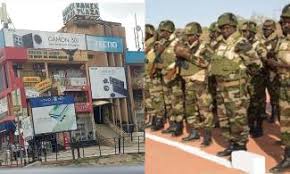By Milcah Tanimu
In a move likely to stir debate over the military’s role in civil affairs, the Nigerian Army has announced the closure of Banex Plaza in Abuja. This decision follows an incident where two soldiers were assaulted, reportedly by workers at the plaza, over a mobile phone sale dispute.
Army spokesperson Major General Onyema Nwachukwu stated that the closure was agreed upon with the plaza’s management to identify and apprehend those responsible for the assault. He emphasized that the temporary shutdown aims to ensure security in the Federal Capital Territory and prevent further attacks on military personnel.
A viral video of the incident showed uniformed soldiers attempting to flee from a mob. In response, soldiers returned to the plaza and allegedly assaulted some civilians. Following the incident, soldiers blocked the entrance to Banex Plaza, halting all business activities.
Typically, incidents like this would fall under police jurisdiction, with civil authorities such as the Abuja administration or the Abuja Municipal Council Area announcing any necessary actions. However, both the police and Abuja administration stated they were not informed about the plaza’s closure.
Abuja police spokesperson Josephine Adeh, in response to inquiries, directed all complaints to the military, indicating no police involvement in the decision.
Human rights lawyer Mojirayo Ogunlana criticized the army’s action, calling it morally and legally wrong. She emphasized that such a move is unconstitutional in a democratic setting.
In his statement, Major General Nwachukwu defended the army’s intervention, highlighting the need to prevent further security threats. He mentioned a recent fatal assault on soldiers in Okuama, Delta State, as a context for their actions in Abuja.
The army’s decision to shut down Banex Plaza and lead the investigation has raised concerns about the balance of military and civil authority in Nigeria. Critics argue that such actions undermine democratic principles and could set a dangerous precedent for military involvement in civilian matters.

